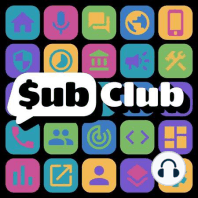52 min listen

Lessons from 121 A/B Tests - Kenneth Schlenker, Opal
Lessons from 121 A/B Tests - Kenneth Schlenker, Opal
ratings:
Length:
47 minutes
Released:
Jan 10, 2024
Format:
Podcast episode
Description
On the podcast we talk with Kenneth about scaling to $5M in ARR on paid ads, positive and negative results from 121 A/B tests, and why they still haven’t built an Android app. ? The Power of a Single Metric: Concentrating on just one key metric can be remarkably effective. In the early stages, it's common to take on too much. By zeroing in on a solitary metric, it becomes simpler to iterate and conduct large-scale testing.? Subscriptions as a Market Fit Gauge: The subscription model acts as a litmus test for your app's value. Gating access early and observing if users are willing to pay offers clear evidence of your app's worth.? Flexibility in Attribution Methods: There's no one-size-fits-all approach to attribution. Various apps adopt diverse strategies. Often, straightforward methods like asking users about their discovery path during onboarding can be the most reliable.?? Prioritizing Creativity in Paid Marketing: If your strategy leans heavily on paid marketing, expect to dedicate at least 80% of your efforts to crafting creative content. For smaller teams, collaborating with content creators and influencers can be an effective strategy for scaling. ? Choosing a Single Platform for Initial Launch: Easing early-stage challenges is feasible by focusing on a single platform. Many startups overextend by launching on multiple platforms simultaneously. Opting for a single platform, such as iOS, allows you to concentrate your limited resources on achieving initial milestones before considering a broader launch.About Guest:?? Founder and CEO of Opal, an app that helps users limit their screen time and find focus.? Even though iOS includes screen time management tools, Kenneth and his team believed they could improve the experience – and that users would pay for it.? “Essentially, if you get people to pay for your products… that's a pretty strong signal that you have something pretty valuable.”? LinkedInLinks & Resources:Connect with Kenneth via LinkedInCheck out Opal: https://www.opal.so/ X: https://twitter.com/kschlenker Episode Highlights:[1:09] A three-phase approach: How the Opal team tackled building a subscription business for a screen time management app.[4:54] When ad spend is worth it: Opal implemented paid marketing from the beginning – and it paid off.[10:44] Attribution made easy: Sometimes the simplest method of finding out where users came from – just asking them! – is the most useful.[13:08] Contracting creatives: Consider hiring independent contractors who care about your mission to build your ad content.[17:22] From premium to freemium: Many apps (like Duolingo) start out free, then add paid subscriptions later. Opal is doing the opposite.[25:53] Work smarter, not harder: Releasing your app on a single platform (instead of iOS, Mac, web, and Android all at once) can save your team a lot of time and money.[30:07] Lessons from 121 A/B tests: Prioritize the bigger swings that will significantly increase your uplift early on.
Released:
Jan 10, 2024
Format:
Podcast episode
Titles in the series (89)
The Next Big Opportunity in Software — Eric Crowley, GP Bullhound: Eric is an investment banker with GP Bullhound, focusing on consumer subscription software (CSS), enterprise software, and financial technology. With investments in companies ranging from Spotify to Fishbrain, and clients such as AllTrails, Partnerize, an by Sub Club by RevenueCat